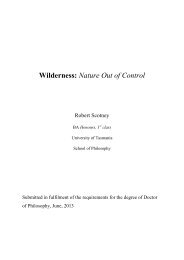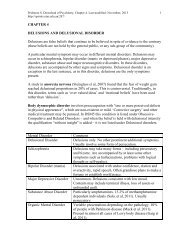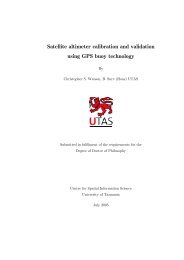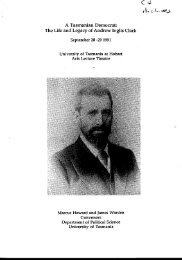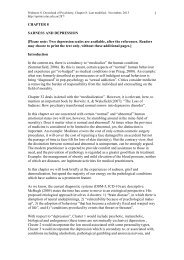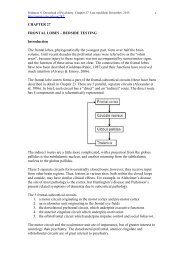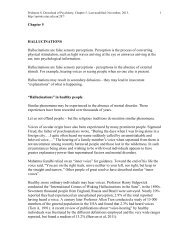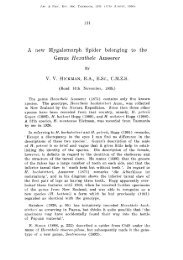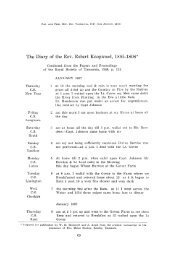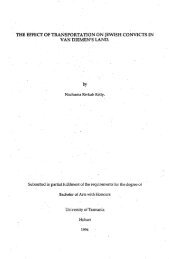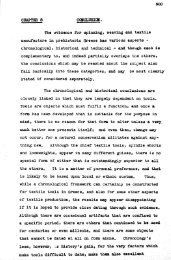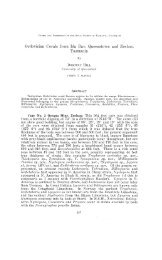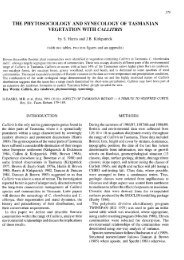- Page 1 and 2:
EDWARD SWARBRECK HALL MEDICAL SCIEN
- Page 3 and 4:
"WHATEVER BETIDE, FOR THE RIGHT ! "
- Page 5 and 6:
I' .· . ·, ) ,. ' ii Section Four
- Page 7 and 8: iv Firstly: In the beginning it was
- Page 9 and 10: vi ABBREVIATIONS CSO & CSD GOl & GO
- Page 11 and 12: , t . t ! -- ·--- - ----·---___ -
- Page 13 and 14: Arnold Joost Von Keppell, (afterwar
- Page 15 and 16: 4 the peculiar prob lems of those o
- Page 17 and 18: 6 four childrn; John Fotheri.ngham
- Page 19 and 20: 8 CHAPTER 2 HOBART TOWN In 1833 Hob
- Page 21 and 22: 10 the attainment of land in the co
- Page 23 and 24: 12 service l11hich they received fr
- Page 25 and 26: 0 14 the Church of England, the Wes
- Page 27 and 28: 16 On one point only, Government of
- Page 29 and 30: 18 CHAPTER 3 THE MEDICAL CLIMATE Un
- Page 31 and 32: ! ' ! : ; ( t :I . r • ' .· ')
- Page 33 and 34: 22 ' in the world where so many acc
- Page 35 and 36: 24 CHAPTER 4 BRIGHTON Brighton, a d
- Page 37 and 38: 26 capable of·. affordi_ng efficie
- Page 39 and 40: Jf?-;'1::; : 28 appointment . · Fo
- Page 41 and 42: 30 sleeping huts at Bagdad Bridge S
- Page 43 and 44: 32 \'IOuld be deemed "legally quali
- Page 45 and 46: 34 CHAPTER 5 THE PROBATION SYSTEM M
- Page 47 and 48: 36 information on this question, an
- Page 49 and 50: 38 discipline, 1dth which so many o
- Page 51 and 52: 40 2 kinds of tickets of leave . 1.
- Page 53 and 54: 42 superintending officers to warn,
- Page 55 and 56: 44 minutes later, on the ringing of
- Page 57: 46 attendance, and the doctor Nas n
- Page 61 and 62: so .,. j ,•· cared for the chil
- Page 63 and 64: 52 ; ! ( ·. its Properties'1 (Garr
- Page 65 and 66: 54 -I as by the attachment of a spi
- Page 67 and 68: 56 on the Saturday evening he and B
- Page 69 and 70: 58 jointly for services by the two
- Page 71 and 72: 60 employed as a Medical Attendant
- Page 73 and 74: 62 alongside the roadway many a whi
- Page 75 and 76: 64 ' I . t. [ 't.l he was shocked b
- Page 77 and 78: Schaw Is removal from Bothwe ll was
- Page 79 and 80: .·;_ I'J,'l!;r. 68 ·The meeti.ng
- Page 81 and 82: 70 Arnott affair, Schaw and Wigmore
- Page 83 and 84: :.f .. ·' -· ,. ' • i . • l
- Page 85 and 86: 74 promptitude ? And ought not thes
- Page 87 and 88: fears ·that Sadler would die durin
- Page 89 and 90: 78 Strict allegiance to and the con
- Page 91 and 92: 80 i I. I we at present experience
- Page 93 and 94: . . 82 they had any cause to compl
- Page 95 and 96: 84 WESTBURY Sadly leaving a tiny gr
- Page 97 and 98: " ·- 86 Around the station the lan
- Page 99 and 100: ·r· '.;.·. v. t '· f 88 to the
- Page 101 and 102: 90 ,. private service. On the 31st
- Page 103 and 104: 92 OATLANDS From Jerusalem Hall tra
- Page 105: 94 >ho assisted Hall to put into ac
- Page 108 and 109:
97 ROSS Early in 1850, on the break
- Page 110 and 111:
1 I ' • . I 99 were floored and c
- Page 112 and 113:
• :.! ."' :,.r.& . -:; . r· ( 10
- Page 114 and 115:
i ., 103 acting conscientiously for
- Page 116 and 117:
•, .:: · t . .. 105 Hal l's of
- Page 118 and 119:
, ...,. .. r: ;.:. ,!. . . ; . 10
- Page 120 and 121:
109 f ' According to the "Lunatic A
- Page 122 and 123:
111 Hall's attempts at reform were
- Page 124 and 125:
I ' Q 113 though not caused solely
- Page 126 and 127:
·' . f . 115 As far as Hall's appo
- Page 128 and 129:
117 CHAPTER 7 HOBART TOWN AGAIN The
- Page 130 and 131:
.., ·;.:), '·).1 'J,.J, , ·....
- Page 132 and 133:
: . 121 they needed much greater ef
- Page 134 and 135:
123 . . 1• scruples or one drachm
- Page 136 and 137:
125 Being :torewarned, are we forea
- Page 138 and 139:
127 Hall1s work was very arduous bu
- Page 140 and 141:
;·•L . .... . . . ,• . . • J
- Page 142 and 143:
J 131 By the Act of Counci 1 11Anno
- Page 144 and 145:
..· 133 open shed for shelter; alt
- Page 146 and 147:
... . I ' 135 The paper suggested t
- Page 148 and 149:
137 Although political temper and c
- Page 150 and 151:
\ 139 further ·behind improvements
- Page 152 and 153:
141 \oJri te to me all by yourself.
- Page 154 and 155:
1·13 ro llt.:d fro::1 ·li llr..:r
- Page 156 and 157:
145 has been so admirab ly dealt wi
- Page 158 and 159:
I i: 147 constitutional grounds , t
- Page 160 and 161:
149 attend at the Bar of the House
- Page 162 and 163:
151 Although the Governor • s per
- Page 164 and 165:
153 guilt or othen'lise of the conv
- Page 166 and 167:
155 to .consider those great works
- Page 168 and 169:
157 I cannot but think you were wro
- Page 170 and 171:
159 \as described by Hal l as a "ve
- Page 172 and 173:
"1 61 --- Every addition to our sto
- Page 174 and 175:
163 improvement which could not be
- Page 176 and 177:
165 Recalling the dry spring and su
- Page 178 and 179:
167 establishment of a new cemetery
- Page 180 and 181:
169 Hal l's extreme concern at the
- Page 182 and 183:
171 Furthermore, in October 1856 ,
- Page 184 and 185:
173 on the same day, it, neverthele
- Page 186 and 187:
175 by D. E. Wilkie, he declared th
- Page 188 and 189:
177 of the Vital Statistics of Hoba
- Page 190 and 191:
179 Carefully and precisely Hall se
- Page 192 and 193:
181 '.I CHAPTER 12 CONFLICT Essenti
- Page 194 and 195:
183 we may be ab le to keep pace in
- Page 196 and 197:
185 of meat per day to counteract t
- Page 198 and 199:
187 He urged that no reliance could
- Page 200 and 201:
as a Quarantine Station. 189 He agr
- Page 202 and 203:
191 inmates of the Hospital, one of
- Page 204 and 205:
193 independent body.l3 Obviously,
- Page 206 and 207:
195 CHAPTER 13 HEALTH REPORTS In an
- Page 208 and 209:
:·· . ,. l 197 sufficient to prod
- Page 210 and 211:
199 Yet, Hal l's article cone luded
- Page 212 and 213:
201 teething, quin zy, gastritis ,
- Page 214 and 215:
203 CHAPTER 14 THE SANITARIUM FOR I
- Page 216 and 217:
205 many peculiar advantages to inv
- Page 218 and 219:
207 He. considered neither Hobarton
- Page 220 and 221:
209 anything else , the Commission'
- Page 222 and 223:
211 It recommended the Government t
- Page 224 and 225:
213 Although Hal l's letter did not
- Page 226 and 227:
215 together. Joints of meat to be
- Page 228 and 229:
217 confusion to free thems elves f
- Page 230 and 231:
219 Not only, however , was the poo
- Page 232 and 233:
·' .. , 221 to Hal l's support. la
- Page 234 and 235:
223 CHAPTER 16 MEDICAL SCIENCE With
- Page 236 and 237:
225 kno\'lledge of the anatomical s
- Page 238 and 239:
227 little cause to dread the dange
- Page 240 and 241:
229 For the first time, he stated h
- Page 242 and 243:
231 Tasmanian institution they foun
- Page 244 and 245:
233 be allowed to speak if he was n
- Page 246 and 247:
235 one quarter of the average for
- Page 248 and 249:
237 influenza \'las more fatal to t
- Page 250 and 251:
239 CHAPTER 17 CONFRONTATION Howeve
- Page 252 and 253:
241 Hobarton Nas certainly the rich
- Page 254 and 255:
and the system of punishment used.
- Page 256 and 257:
J. Doughty E. S. Hall 245 £1.1.0.
- Page 258 and 259:
247 another note of accusation, Hal
- Page 260 and 261:
249 CrO\'Ither 's letterl ' which H
- Page 262 and 263:
251 be defined by Parliament, and t
- Page 264 and 265:
253 cause of justice, truth and hum
- Page 266 and 267:
monies . 2 Superfi cially, Bedford'
- Page 268 and 269:
257 daily repasts. Baked meat and p
- Page 270 and 271:
.. 259 enquire into the Public Serv
- Page 272 and 273:
261 children, of ages corresponding
- Page 274 and 275:
263 Specifically , Hall's activitie
- Page 276 and 277:
265 unhappy economic predicament .
- Page 278 and 279:
9 267 this island ch osen the Sanit
- Page 280 and 281:
269 \'lh i ch , together with anoth
- Page 282 and 283:
271 2. The extent of cloudy sky has
- Page 284 and 285:
. · ' ennumerated population. 273
- Page 286 and 287:
• 275 The annual average of death
- Page 288 and 289:
·, 277 11carefully elaborated" pap
- Page 290 and 291:
279 . ' S E C T I 0 N F 0 U R COLON
- Page 292 and 293:
! 281 J. Perkins to question in Par
- Page 294 and 295:
283 appointment ; that he should ha
- Page 296 and 297:
vaccination of their children" ; 28
- Page 298 and 299:
,· 287 the total amount disbursed
- Page 300 and 301:
289 Vaccination in Tasmania", later
- Page 302 and 303:
I ' 1 I•. 291 From November 1, 18
- Page 304 and 305:
293 Petition as "very sensible" , t
- Page 306 and 307:
·'· 295 the Premier, A. Kenner le
- Page 308 and 309:
297 subsidy of £800 granted by the
- Page 310 and 311:
299 anything to eat but pig potatoe
- Page 312 and 313:
six and over, was an extravagance;
- Page 314 and 315:
303 £19 .10.11 in 1866. 13 In its
- Page 316 and 317:
·.. 305 decrease in staff, better
- Page 318 and 319:
307 Colonial Secretary and to warn
- Page 320 and 321:
309 age of twelve to face a grim an
- Page 322 and 323:
-. 3ll On July 4, 1873, Parliament,
- Page 324 and 325:
313 Yet he found the children gainf
- Page 326 and 327:
315 CHAPTER 22 HEALTH OFFICER On Au
- Page 328 and 329:
317 He then described in detail Bar
- Page 330 and 331:
319 observations for the next five
- Page 332 and 333:
321 i1wratitudu, he has stuck to hi
- Page 334 and 335:
323 people - at Brighton in Septemb
- Page 336 and 337:
325 at its Twentieth Annual Meeting
- Page 338 and 339:
·• 327 public men . Such an outb
- Page 340 and 341:
329 THE HALL FAMILY EDWARD SWARBREC
- Page 342 and 343:
331 ;.... ier, January 1, 1858. Glu
- Page 344 and 345:
333 The temperature mean \'las 60 .
- Page 346 and 347:
335 In the Constitutional class the
- Page 348 and 349:
337 BIBLIOGRAPHY This study was res
- Page 350 and 351:
_.-, 339 14. "On a Probably New Spe
- Page 352 and 353:
.· 341 5. Vaccination and Smallpox
- Page 354 and 355:
343 PARLIAMENTARY COMMITTEES REFERR
- Page 356 and 357:
HISTORY OF IEDICINE IN TASMANIA 345
- Page 358 and 359:
347 IMPORTANT ARTICLES, REPORTS , E
- Page 360 and 361:
349 9. Non-State Papers (cont.) 0
- Page 362 and 363:
351 CROWfHER COLLECTION Crowther Fi
- Page 364:
353 ENGLISH BOOKS R. Lambert, Sir J



